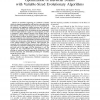Free Online Productivity Tools
i2Speak
i2Symbol
i2OCR
iTex2Img
iWeb2Print
iWeb2Shot
i2Type
iPdf2Split
iPdf2Merge
i2Bopomofo
i2Arabic
i2Style
i2Image
i2PDF
iLatex2Rtf
Sci2ools
134
click to vote
CIBCB
2007
IEEE
2007
IEEE
Optimization of Bacterial Strains with Variable-Sized Evolutionary Algorithms
—In metabolic engineering it is difficult to identify which set of genetic manipulations will result in a microbial strain that achieves a desired production goal, due to the complexity of the metabolic and regulatory cellular networks and to the lack of appropriate modeling and optimization tools. In this work, Evolutionary Algorithms (EAs) are proposed for the optimization of the set of gene deletions to apply to a microorganism, in order to maximize a given objective function. Each mutant strain is evaluated by resorting to the simulation of its phenotype using the Flux-Balance Analysis approach, together with the premise that microorganisms have maximized their growth along natural evolution. A new set based representation is used in the EAs, using variable size chromosomes, allowing for the automatic discovery of the optimal number of gene deletions. This approach was compared with a traditional binary-based Genetic Algorithm. Two case studies are presented considering the prod...
Related Content
| Added | 18 Oct 2010 |
| Updated | 18 Oct 2010 |
| Type | Conference |
| Year | 2007 |
| Where | CIBCB |
| Authors | Miguel Rocha, José P. Pinto, Isabel Rocha, Eugénio C. Ferreira |
Comments (0)

